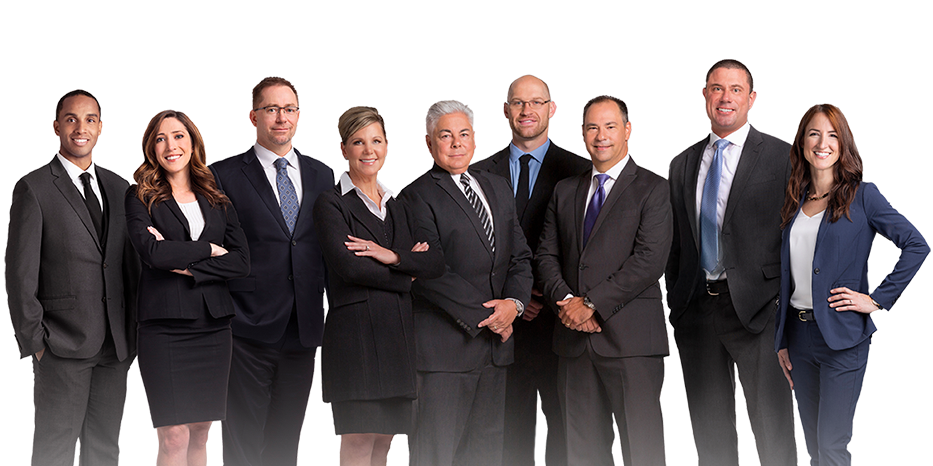
Reno Truck Accident Attorneys
Fighting for Truck Accident Victims in Nevada
A large number of the collisions that occur between semi-trucks and passenger vehicles result from preventable human error. Unfortunately, when massive 80,000-pound trucks collide with cars that are less than one-tenth of their weight, the result is often life-altering catastrophic injury or fatality. When these accidents are caused by negligence—either by a truck driver, a trucking company, or another entity—victims have a legal right to seek compensation for damages.
If you or a loved one has been injured in a truck accident in Nevada, contact Viloria, Oliphant, Oster & Aman L.L.P. to request a case review. We skillfully handle all types of truck accident cases, including those involving intoxicated drivers, fatigued drivers, distracted drivers, maintenance failures, negligent hiring, and improperly loaded trailers. Backed by an impressive history of verdicts and settlements and more than a century of combined legal experience, you can count on our firm to deliver.
Call Viloria, Oliphant, Oster & Aman L.L.P. today at (775) 227-2280 or contact us online to schedule a meeting with our truck accident lawyer in Reno!
Common Causes of Truck Accidents
Because liability in truck accident claims is so complex, it is critical to determine exactly how the accident occurred and what factors contributed to it. Pinpointing the cause of the accident allows our team to effectively bring a claim against the responsible person or party.
Some common causes of large semi-truck and other commercial vehicle accidents include:
- Truck Driver Negligence: This includes actions such as eating, drinking, or texting while driving; other forms of distracted driving; negligently failing to follow traffic laws and/or the rules of the road; driving while tired or falling asleep at the wheel; insufficient vehicle maintenance (when this is the responsibility of the driver); and more. Understanding these behaviors and their impacts on safety can enhance prevention strategies.
- Truck Driver Misconduct: As opposed to negligence, misconduct implies a greater level of intent. Examples include drunk driving or drugged driving; reckless driving, such as swerving in and out of lanes or excessive speeding; aggressive driving, such as cutting off other drivers or engaging in road rage behaviors. Addressing these issues often involves both legal penalties and driver re-education.
- Negligent Trucking Company Practices: Examples include negligent hiring or supervision, failing to conduct background checks on truck drivers, encouraging or not punishing truck drivers for violating federal hours-of-service regulations, and pushing unrealistic quotas and/or schedules or punishing truck drivers for failing to meet such requirements. Proper oversight and adherence to safety standards are crucial to prevent such negligence.
- Defective Trucks/Truck Parts: Defectively designed or manufactured trucks and truck parts contribute to these types of accidents every year. Common defective truck parts include tires, braking systems, engine components, headlights and taillights, reflective strips, backup signals, cargo doors, and more. Regular maintenance and prompt recalls on defective parts are essential to mitigate these risks.
- Poor Weather Conditions: While no one can be held responsible for the weather, truck drivers have a responsibility to drive even more safely when conditions are bad. This might include actions such as reducing speeds, using daytime headlights, or waiting out particularly unsafe conditions, such as icy roads. Increased awareness and technologically advanced safety measures can aid drivers in adverse conditions.
Understanding Reno's Local Trucking Regulations
Navigating the complex landscape of trucking laws can be challenging. In Reno and throughout Nevada, trucking regulations are enforced to ensure safety on highways and local roads. These regulations are particularly critical given the high volume of freight traffic passing through the region, often involving vehicles like 18-wheelers and semi-trucks.
Nevada's adherence to Federal Motor Carrier Safety Administration (FMCSA) standards plays a significant role. These standards cover everything from vehicle maintenance schedules to driver work-hour limits under the Hours of Service rules. Understanding these laws is crucial for any involved party in an accident, as breaches can significantly impact liability determinations. Furthermore, Reno's unique topography and climate necessitate specific precautions, such as regulations on tire chains during winter months to prevent accidents on icy roads. Our firm, Viloria, Oliphant, Oster & Aman L.L.P., offers in-depth knowledge of these local and state regulations, allowing us to expertly navigate compliance issues when representing clients.
How We Support Our Clients Beyond the Courtroom
At Viloria, Oliphant, Oster & Aman L.L.P., our commitment to clients extends far beyond the courtroom. We understand that accident recovery is as much about personal well-being as it is about legal resolution. This holistic approach underpins how we handle every case. Our dedication is evident in our client communication practices, which include flexible scheduling options and diligent follow-ups to ensure we're meeting clients' evolving needs throughout their recovery period.
To further support our clients, we collaborate with an array of professionals, including medical experts, life-care planners, and financial advisers. These partnerships enable us to provide comprehensive assistance that covers physical recovery, future financial planning, and psychological support. By approaching each case with a broad, client-centered strategy, we aim to alleviate the stresses involved in legal procedures while maximizing each client's recovery outcomes. Our long-standing reputation in Northern Nevada for compassionate, detailed, and robust legal advocacy stands testament to our effectiveness and dedication.
What Steps Should I Take After a Truck Accident?
After any collision with an 18-wheeler, semi-truck, or other type of commercial vehicle, you should take the following steps:
- Call the police and/or 911 at the scene of the accident. Ensure that you obtain a copy of the police report and keep track of all of your medical records. These documents provide crucial evidence that substantiates your claim and helps in determining liability.
- Obtain medical care and follow your doctor’s recommended course of treatment. You mustn't delay in seeking medical attention. If there is a gap between the time of your accident and the time you seek treatment, the insurance company will argue that your injuries must have resulted from some other cause. Consistent medical documentation supports your case’s credibility.
- Contact an attorney before making any statement to the other party’s insurance company. The truck driver will have an attorney paid for by the trucking company’s insurance provider. Because he or she already has a lawyer, you also need one on your side. Legal counsel ensures that your rights are protected and that you navigate the claims process effectively.
Who Is Liable in a Truck Accident?
Truck accident claims are not like other types of motor vehicle cases. Personal injury and wrongful death cases involving large commercial vehicle accidents are often incredibly complex due to various factors, including liability.
You can file a claim against the at-fault driver in a typical car accident case. This person is usually the sole liable party (or the sole entity against whom you bring a claim). However, in truck accident cases, the injured party typically files a claim against the trucking company, not the truck driver. This is because employers are generally responsible for the conduct of their employees under what are known as respondeat superior laws. Thus, the trucking company can be held legally liable for damages even when the truck driver was the one who acted negligently and caused the accident.
However, in some circumstances, the trucking company may not be liable. This could be the case when the truck driver was violating company policy, such as by driving while under the influence of alcohol or drugs, or when another outside factor substantially contributed to the accident. An example might be a case in which a defective truck tire blows out on the highway, causing the truck driver to lose control of the vehicle and slam into your car. In such a case, the manufacturer or distributor of the defective tire could be held partially or wholly liable for your damages. Understanding these nuances is crucial in shaping a strong legal strategy for your case.
What Damages Can Be Recovered in a Truck Accident Claim?
Victims of truck accidents may be eligible to receive a range of damages, which can include:
- Medical expenses
- Lost wages
- Pain and suffering
- Property damage
- Emotional distress
- Rehabilitation costs
- Wrongful death benefits
Viloria, Oliphant, Oster & Aman L.L.P. works with a team of medical and other experts when handling truck accident cases involving catastrophic injuries, such as brain injuries and spinal cord injuries. Our Reno truck accident lawyers frequently partner with accident reconstruction experts, life care planners, vocational rehabilitation specialists, economists, liability specialists, and other professionals to develop each case. Our approach is to pursue the maximum possible verdict or settlement for our clients. By leveraging detailed investigations and expert insights, we aim to ensure comprehensive compensation that reflects the full impact of the accident on victims.
What is the Statute of Limitations for a Truck Accident Claim in Nevada?
In Nevada, the statute of limitations for initiating a truck accident claim is generally set at two years from the accident date. However, exceptions may arise in situations involving government entities or minors. It is imperative to promptly seek legal representation to safeguard your rights and improve the likelihood of securing compensation. Understanding the legal timelines and documentation requirements is crucial in preserving your claim's validity and strength.
Contact Our Reno Truck Accident Lawyers Today
If you've been injured in a truck accident, you don't have to face the legal process alone. At Viloria, Oliphant, Oster & Aman L.L.P., we're committed to advocating for your rights and securing the compensation you deserve. With our dedication and track record, you can trust us to fight tirelessly on your behalf. Contact us today and let us help you navigate your truck accident claim.
Contact Viloria, Oliphant, Oster & Aman L.L.P. today to schedule a meeting with our Reno truck accident attorney!
Frequently Asked Questions
How Long Does a Truck Accident Claim Process Take in Reno?
The duration of a truck accident claim process can vary significantly based on several factors, including the complexity of the case, the willingness of parties to negotiate a settlement, and the court’s availability. In Reno, as in many jurisdictions, straightforward cases may resolve in a few months, while complex cases involving severe injuries or disputed liability may take longer—potentially over a year. It's essential to seek prompt legal advice to speed up the process through efficient case management. Our team at Viloria, Oliphant, Oster & Aman L.L.P. is dedicated to moving cases forward as quickly and efficiently as possible while ensuring that clients receive the comprehensive settlements they deserve.
What Should I Avoid After a Truck Accident in Reno?
After a truck accident, it's crucial to avoid certain actions that could jeopardize your case. Primarily, do not apologize or admit any fault at the scene of the accident, as this can be misinterpreted as an admission of liability. Additionally, avoid providing detailed statements to the insurance company without first consulting your attorney. Insurance adjusters are skilled at prompting responses that could weaken your claim. It's also important not to settle too quickly. Early settlement offers often undervalue the actual damages and long-term consequences of the injury. Consulting with an attorney ensures you understand the full scope of your entitlements and avoid common pitfalls in the claims process.
What Evidence is Essential in Building a Strong Truck Accident Case?
Building a strong truck accident case in Reno requires gathering comprehensive evidence that supports your claims. Key types of evidence include the police accident report, witness statements, and photographic evidence from the accident scene. Medical records documenting your injuries and treatment are crucial, as are any records of employment disruptions to justify lost wages claims. Additionally, data from the truck's electronic logging device (ELD) and any potential traffic camera footage can be invaluable. An attorney will typically assist in collecting this evidence efficiently. At Viloria, Oliphant, Oster & Aman L.L.P., we work passionately to ensure all pertinent evidence is gathered and analyzed to fortify our clients' cases.


At Viloria, Oliphant, Oster & Aman, L.L.P., our attorneys offer the support and resources of a large firm, but with the focused attention and care of small firm.
Client Success Stories
-
They got me the proper care
Kerra V. -
I would highly recommend his services.
T.S. -
Our experience with this firm was outstanding
Gretchen M.

-
Our Strategy
We’re true trial lawyers. We prepare every case as if it’s going to trial. This ensures we’re ready for the unexpected.
-
Our Resources
When your case is bigger than you, you need a firm with the resources to support and guide you through it.
-
Our Availability
When you call, we answer. It’s that simple. We understand that the key to results is constant communication.
-
Our Experience
You need an attorney who hasn’t just learned about the law, but someone who practices it day in and day out.

